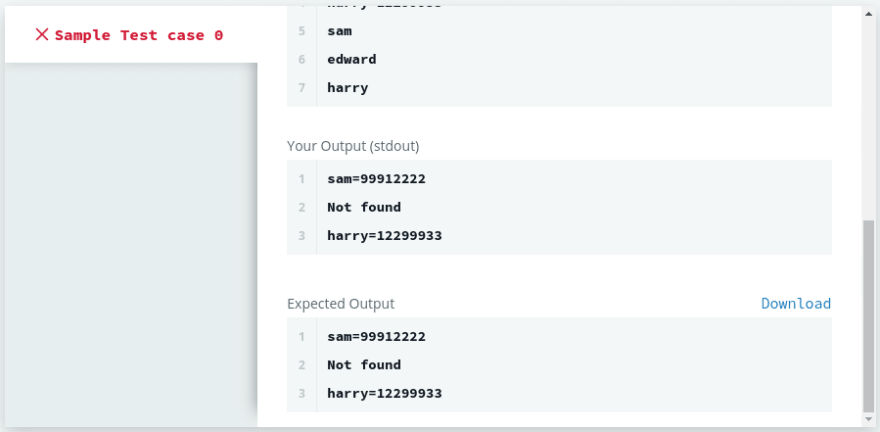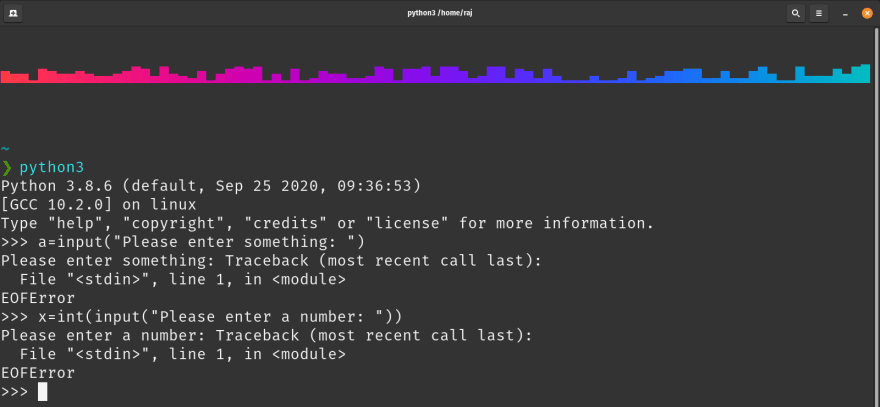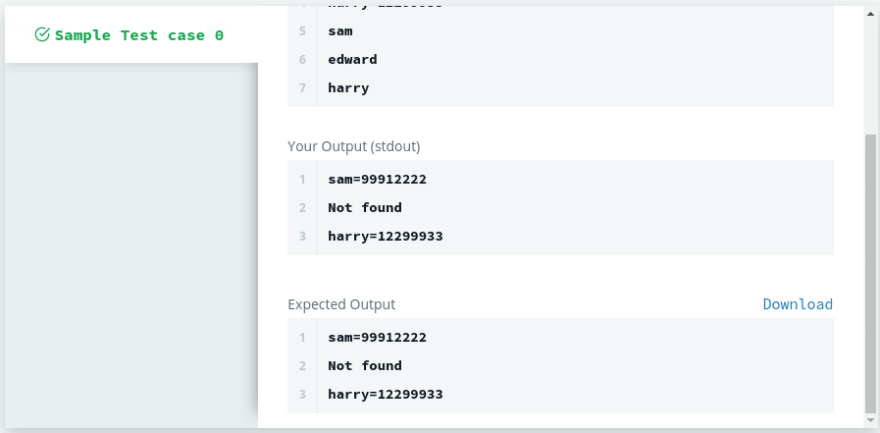В Python простой, но строгий синтаксис. Если забыть закрыть блок кода, то возникнет ошибка «SyntaxError: unexpected EOF while parsing». Это происходит часто, например, когда вы забыли добавить как минимум одну строку в цикл for.
В этом материале разберемся с этой ошибкой, и по каким еще причинам она возникает. Разберем несколько примеров, чтобы понять, как с ней справляться.
Ошибка «SyntaxError: unexpected EOF while parsing» возникает в том случае, когда программа добирается до конца файла, но не весь код еще выполнен. Это может быть вызвано ошибкой в структуре или синтаксисе кода.
EOF значит End of File. Представляет собой последний символ в Python-программе.
Python достигает конца файла до выполнения всех блоков в таких случаях:
- Если забыть заключить код в специальную инструкцию, такую как, циклы for или while, или функцию.
- Не закрыть все скобки на строке.
Разберем эти ошибки на примерах построчно.
Пример №1: незавершенные блоки кода
Циклы for и while, инструкции if и функции требуют как минимум одной строки кода в теле. Если их не добавить, результатом будет ошибка EOF.
Рассмотрим такой пример цикла for, который выводит все элементы рецепта:
ingredients = ["325г муки", "200г охлажденного сливочного масла", "125г сахара", "2 ч. л. ванили", "2 яичных желтка"]
for i in ingredients:
Определяем переменную ingredients, которая хранит список ингредиентов для ванильного песочного печенья. Используем цикл for для перебора по каждому из элементов в списке. Запустим код и посмотрим, что произойдет:
File "main.py", line 4
^
SyntaxError: unexpected EOF while parsingВнутри цикла for нет кода, что приводит к ошибке. То же самое произойдет, если не заполнить цикл while, инструкцию if или функцию.
Для решения проблемы требуется добавить хотя бы какой-нибудь код. Это может быть, например, инструкция print() для вывода отдельных ингредиентов в консоль:
for i in ingredients:
print(i)
Запустим код:
325г муки
200г охлажденного сливочного масла
125г сахара
2 ч. л. ванили
2 яичных желткаКод выводит каждый ингредиент из списка, что говорит о том, что он выполнен успешно.
Если же кода для такого блока у вас нет, используйте оператор pass как заполнитель. Выглядит это вот так:
for i in ingredients:
pass
Такой код ничего не возвращает. Инструкция pass говорит о том, что ничего делать не нужно. Такое ключевое слово используется в процессе разработке, когда разработчики намечают будущую структуру программы. Позже pass заменяются на реальный код.
Пример №2: незакрытые скобки
Ошибка «SyntaxError: unexpected EOF while parsing» также возникает, если не закрыть скобки в конце строки с кодом.
Напишем программу, которая выводит информацию о рецепте в консоль. Для начала определим несколько переменных:
name = "Капитанская дочка"
author = "Александр Пушкин"
genre = "роман"
Отформатируем строку с помощью метода .format():
print('Книга "{}" - это {}, автор {}'.format(name, genre, author)
Значения {} заменяются на реальные из .format(). Это значит, что строка будет выглядеть вот так:
Книга "НАЗВАНИЕ" - это ЖАНР, автор АВТОРЗапустим код:
File "main.py", line 7
^
SyntaxError: unexpected EOF while parsingНа строке кода с функцией print() мы закрываем только один набор скобок, хотя открытыми были двое. В этом и причина ошибки.
Решаем проблему, добавляя вторую закрывающую скобку («)») в конце строки с print().
print('Книга "{}" - это {}, автор {}'.format(name, genre, author))
Теперь на этой строке закрываются две скобки. И все из них теперь закрыты. Попробуем запустить код снова:
Книга "Капитанская дочка" это роман. Александр ПушкинТеперь он работает. То же самое произойдет, если забыть закрыть скобки словаря {} или списка [].
Выводы
Ошибка «SyntaxError: unexpected EOF while parsing» возникает, если интерпретатор Python добирается до конца программы до выполнения всех строк.
Для решения этой проблемы сперва нужно убедиться, что все инструкции, включая while, for, if и функции содержат код. Также нужно проверить, закрыты ли все скобки.
EOF stands for End Of File. Well, technically it is not an error, rather an exception. This exception is raised when one of the built-in functions, most commonly input() returns End-Of-File (EOF) without reading any data.
EOF error is raised in Python in some specific scenarios:
- Sometimes all program tries to do is to fetch something and modify it. But when it is unable to fetch, it will raise this exception.
- When the input() function is interrupted in both Python 2.7 and Python 3.6+, or when the input() reaches the end of a file unexpectedly in Python 2.7.
All Built-in Exceptions in Python inherit from the BaseException class or extend from an inherited class therein. The full exception hierarchy of this error is:
BaseException -> Exception -> EOFError
The best practice to avoid EOF in python while coding on any platform is to catch the exception, and we don’t need to perform any action so, we just pass the exception using the keyword “pass” in the “except” block.
Consider the following code for the question in CodeChef K-Foldable String (KFOLD):
C++
#Python program for the above question
#Function to reorder the characters
#of the string
def main():
t = int(input())
while t:
# Input variables
n, k = map(int, input().split())
s = input()
ans = ""
# Initialize dictionary
s_dict = dict()
for ch in s:
s_dict[ch] = s_dict.get(ch, 0) + 1
q = n
a1 = s_dict['1']
a0 = s_dict['0']
# Check for valid conditions
if(s_dict['1']%2!=0 or s_dict['0']%2!=0 \\
or s_dict['1']%q!=0 or s_dict['0']%q!=0):
ans = "Impossible"
# Otherwise update the result
else:
st = ('0'*a0) + ('1'*a1)
st = ('1'*a1) + ('0'*a0)
part1 = st + st_rev
ans = part1*(q
# Print the result for the
# current test case
print(ans)
t -= 1
return
# Driver Code
if __name__=="__main__":
main()
Output:
It gives the EOF error as shown below:
The solution to the above EOF error is to enclose the code in try and except block and deal with exception accordingly, the approach to handle this exception is shown below:
C++
# Python program for the above question
# Function to reorder the characters
#of the string
try : t = int(input())
# Input test cases
while t:
# Input Variables
n, k = map(int, input().split())
s = input()
ans = ""
# Initialize dictionary
s_dict = dict()
for ch in s:
s_dict[ch] = s_dict.get(ch, 0) + 1
q = n
a1 = s_dict['1']
a0 = s_dict['0']
# Check for valid conditions
if(s_dict['1']%2!=0 or s_dict['0']%2!=0 \\
or s_dict['1']%q!=0 or s_dict['0']%q!=0):
ans = "Impossible"
# Otherwise update the result
else:
st = ('0'*a0) + ('1'*a1)
st = ('1'*a1) + ('0'*a0)
part1 = st + st_rev
ans = part1*(q
# Print the result for the
# current test case
print(ans)
t -= 1
except:
pass
Output:
Last Updated :
24 Nov, 2020
Like Article
Save Article
Error messages help us solve/fix problems in our code. But some error messages, when you first see them, may confuse you because they seem unclear.
One of these errors is the «SyntaxError: unexpected EOF while parsing» error you might get in Python.
In this article, we’ll see why this error occurs and how to fix it with some examples.
Before we look at some examples, we should first understand why we might encounter this error.
The first thing to understand is what the error message means. EOF stands for End of File in Python. Unexpected EOF implies that the interpreter has reached the end of our program before executing all the code.
This error is likely to occur when:
- we fail to declare a statement for loop (
while/for) - we omit the closing parenthesis or curly bracket in a block of code.
Have a look at this example:
student = {
"name": "John",
"level": "400",
"faculty": "Engineering and Technology"
In the code above, we created a dictionary but forgot to add } (the closing bracket) – so this is certainly going to throw the «SyntaxError: unexpected EOF while parsing» error our way.
After adding the closing curly bracket, the code should look like this:
student = {
"name": "John",
"level": "400",
"faculty": "Engineering and Technology"
}This should get rid of the error.
Let’s look at another example.
i = 1
while i < 11:In the while loop above, we have declared our variable and a condition but omitted the statement that should run until the condition is met. This will cause an error.
Here is the fix:
i = 1
while i < 11:
print(i)
i += 1
Now our code will run as expected and print the values of i from 1 to the last value of i that is less than 11.
This is basically all it takes to fix this error. Not so tough, right?
To be on the safe side, always enclose every parenthesis and braces the moment they are created before writing the logic nested in them (most code editors/IDEs will automatically enclose them for us).
Likewise, always declare statements for your loops before running the code.
Conclusion
In this article, we got to understand why the «SyntaxError: unexpected EOF while parsing» occurs when we run our code. We also saw some examples that showed how to fix this error.
Happy Coding!
Learn to code for free. freeCodeCamp’s open source curriculum has helped more than 40,000 people get jobs as developers. Get started
So as we can see in the pictures above, despite having produced the expected output, our test case fails due to a runtime error EOFError i.e., End of File Error. Let’s understand what is EOF and how to tackle it.
What is EOFError
In Python, an EOFError is an exception that gets raised when functions such as input() or raw_input() in case of python2 return end-of-file (EOF) without reading any input.
When can we expect EOFError
We can expect EOF in few cases which have to deal with input() / raw_input() such as:
-
Interrupt code in execution using
ctrl+dwhen an input statement is being executed as shown below
-
Another possible case to encounter EOF is, when we want to take some number of inputs from user i.e., we do not know the exact number of inputs; hence we run an infinite loop for accepting inputs as below, and get a Traceback Error at the very last iteration of our infinite loop because user does not give any input at that iteration
n=int(input())
if(n>=1 and n<=10**5):
phone_book={}
for i in range(n):
feed=input()
phone_book[feed.split()[0]]=feed.split()[1]
while True:
name=input()
if name in phone_book.keys():
print(name,end="")
print("=",end="")
print(phone_book[name])
else:
print("Not found")
Enter fullscreen mode
Exit fullscreen mode
The code above gives EOFError because the input statement inside while loop raises an exception at last iteration
Do not worry if you don’t understand the code or don’t get context of the code, its just a solution of one of the problem statements on HackerRank 30 days of code challenge which you might want to check
The important part here is, that I used an infinite while loop to accept input which gave me a runtime error.
How to tackle EOFError
We can catch EOFError as any other error, by using try-except blocks as shown below :
try:
input("Please enter something")
except:
print("EOF")
Enter fullscreen mode
Exit fullscreen mode
You might want to do something else instead of just printing «EOF» on the console such as:
n=int(input())
if(n>=1 and n<=10**5):
phone_book={}
for i in range(n):
feed=input()
phone_book[feed.split()[0]]=feed.split()[1]
while True:
try:
name=input()
except EOFError:
break
if name in phone_book.keys():
print(name,end="")
print("=",end="")
print(phone_book[name])
else:
print("Not found")
Enter fullscreen mode
Exit fullscreen mode
In the code above, python exits out of the loop if it encounters EOFError and we pass our test case, the problem due to which this discussion began…
Hope this is helpful
If you know any other cases where we can expect EOFError, you might consider commenting them below.
width, height = map(int, input().split())
def rectanglePerimeter(width, height):
return ((width + height)*2)
print(rectanglePerimeter(width, height))
Running it like this produces:
% echo "1 2" | test.py
6
I suspect IDLE is simply passing a single string to your script. The first input() is slurping the entire string. Notice what happens if you put some print statements in after the calls to input():
width = input()
print(width)
height = input()
print(height)
Running echo "1 2" | test.py produces
1 2
Traceback (most recent call last):
File "/home/unutbu/pybin/test.py", line 5, in <module>
height = input()
EOFError: EOF when reading a line
Notice the first print statement prints the entire string '1 2'. The second call to input() raises the EOFError (end-of-file error).
So a simple pipe such as the one I used only allows you to pass one string. Thus you can only call input() once. You must then process this string, split it on whitespace, and convert the string fragments to ints yourself. That is what
width, height = map(int, input().split())
does.
Note, there are other ways to pass input to your program. If you had run test.py in a terminal, then you could have typed 1 and 2 separately with no problem. Or, you could have written a program with pexpect to simulate a terminal, passing 1 and 2 programmatically. Or, you could use argparse to pass arguments on the command line, allowing you to call your program with
test.py 1 2



![SyntaxError Unexpected EOF While Parsing Python Error [Solved]](https://www.freecodecamp.org/news/content/images/size/w2000/2022/03/solve.jpg)




